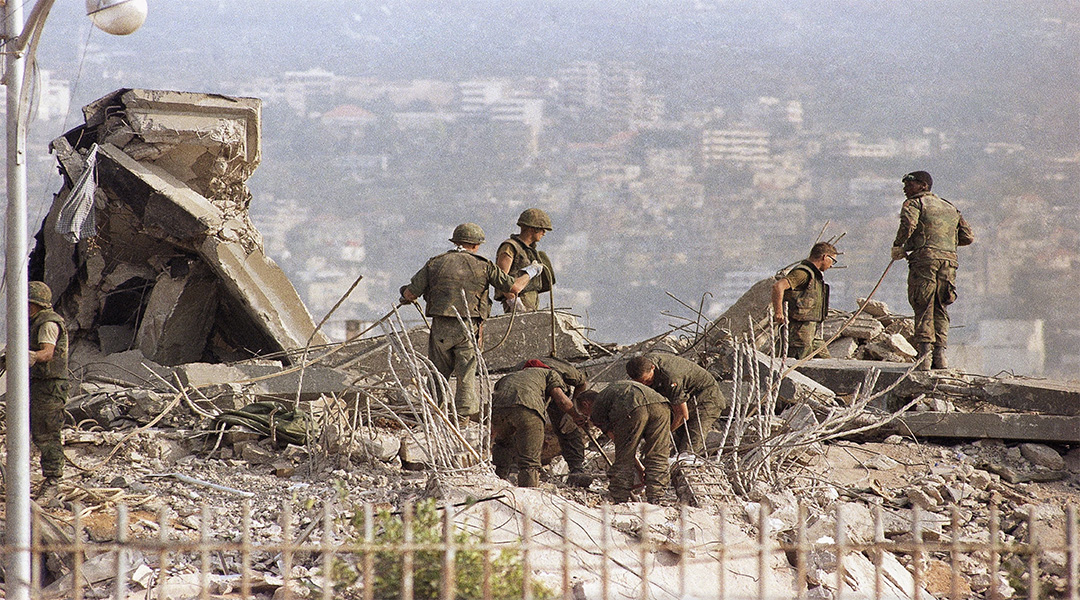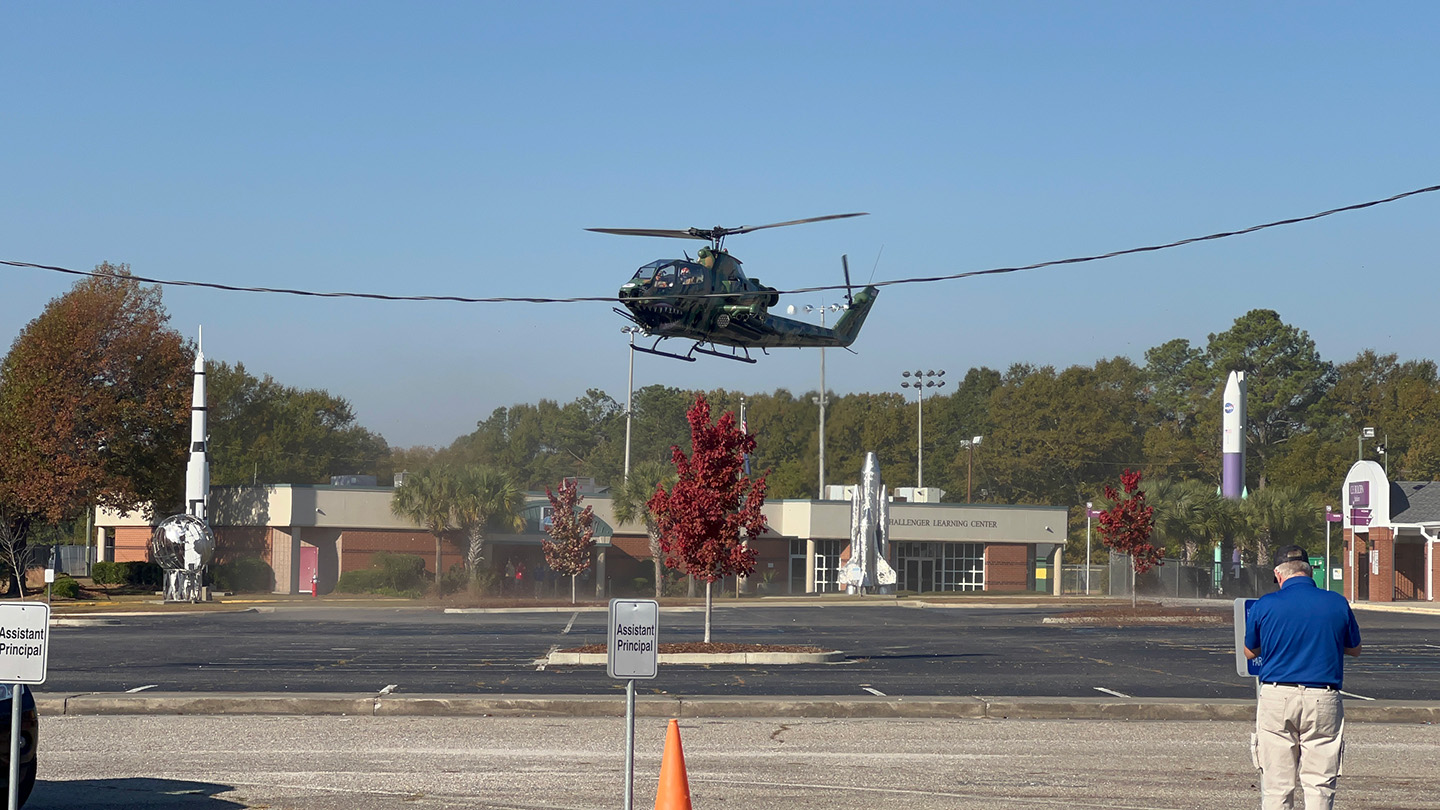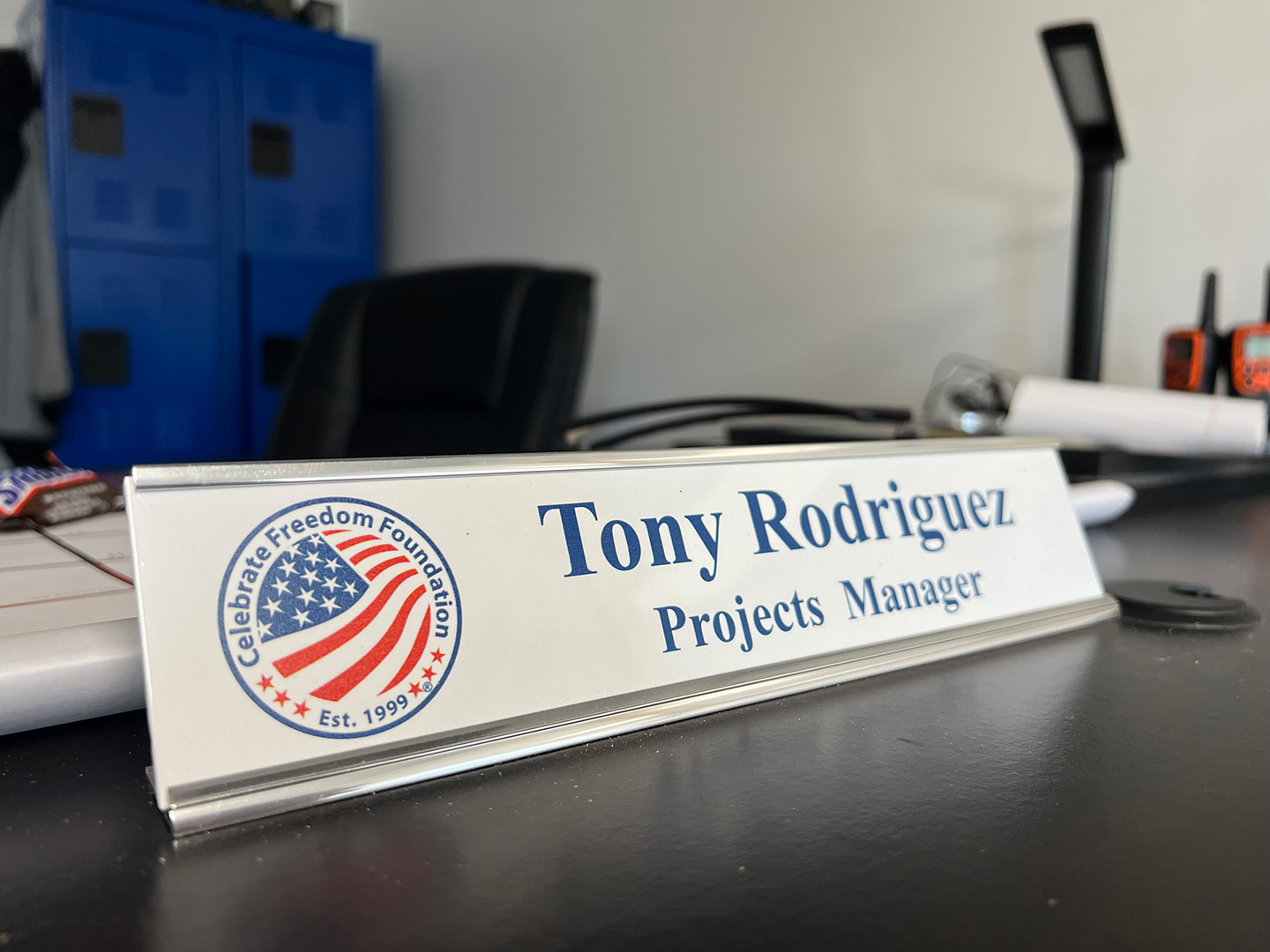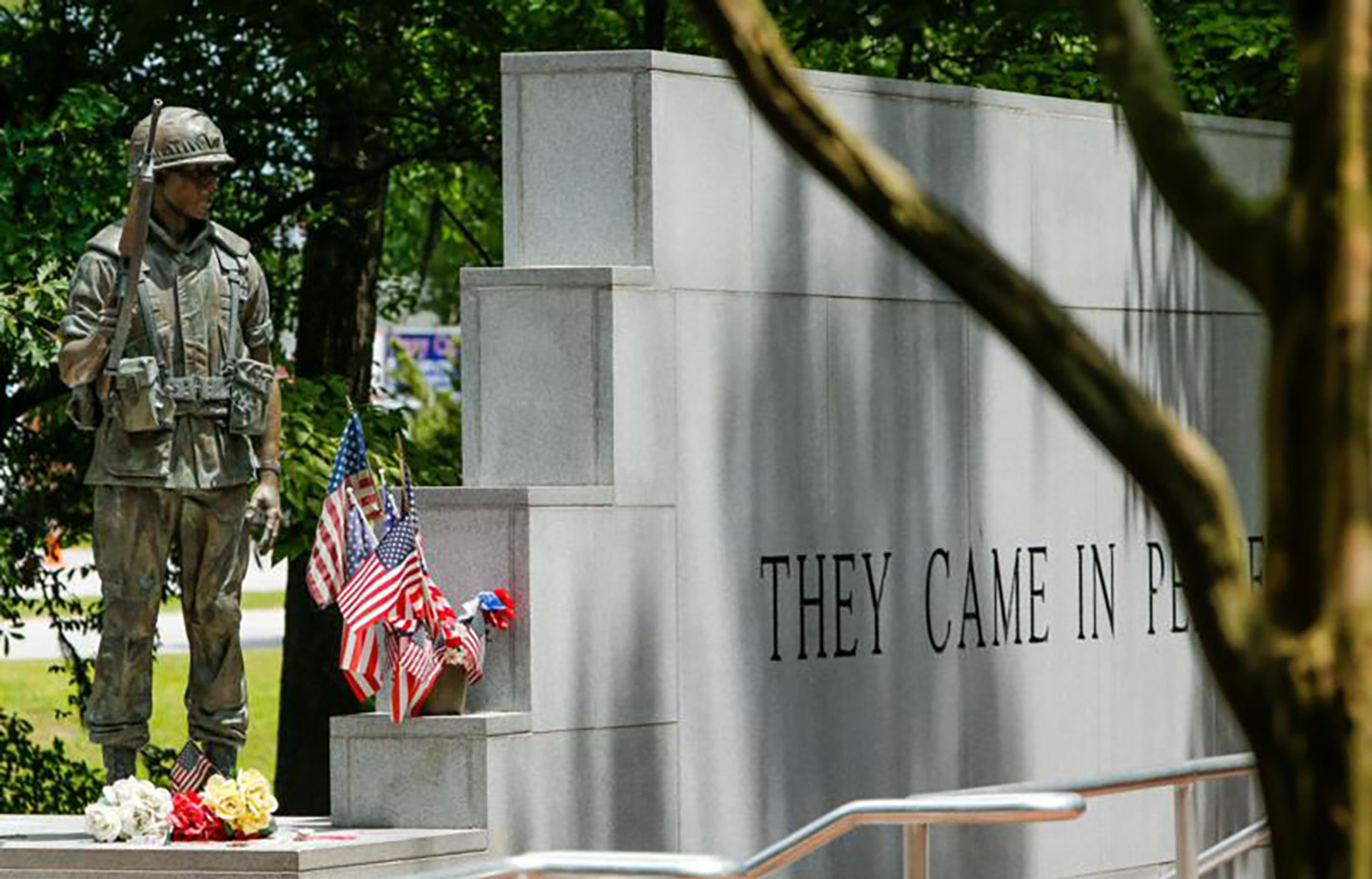The scene around the U.S. Marine base near the Beirut Airport following a massive bomb blast that destroyed much of the base and caused a huge death toll on Oct. 23, 1983 (Associated Press file photo/Carolina News and Reporter)
It’s a Sunday morning. He’s up and about to call his parents.
He’s turning 19 today.
But Tony Rodriguez never gets to make that call.
A bomb went off at 6:22 a.m. at the barracks where he lived.
“The war on terrorism started on the 23rd of October, 1983,” Cpl. Tony Rodriguez said. “It started that day.”
The Beirut bombing happened on Oct. 23, 1983, in Beirut, Lebanon, during the Lebanese Civil War.
Rodriguez, along with fellow U.S. service members, was there as part of a United Nations multinational peacekeeping operation.
At the time, the bombing marked the single-deadliest day for the U.S. military since the 1968 Tet Offensive during the Vietnam War. Military deaths included 220 Marines, 18 sailors and three Army soldiers. Six civilians and 58 French service members also were killed, and more than 100 people were injured.
That was just more than 40 years ago.
Rodriguez, 59, has only recently opened up about it, telling his story for the first time just weeks ago to a military publication.
He lives in the present now, working with other veterans doing volunteer work with young people in Columbia, South Carolina.
But agreed to sit down recently with the Carolina News and Reporter to talk once more about the day that changed his life.
“It was like yesterday,” he said.
A truck with the bomb drives into the barracks where hundreds of U.S. military members still are sleeping.
It looks like a nuclear explosion, Rodriguez said.
Everything is happening so fast.
He realizes the noise was an explosion, tries to secure the area and look for survivors.
But the Americans are receiving sniper fire from terrorists. Many assumed it was Hezbollah.
“I went from 0 to 100, nonstop,” Rodriguez said.
Because of military rules of engagement, U.S. service members don’t have their weapons already locked and loaded.
The guys at the checkpoints were loading their weapons, but there wasn’t ample time to stop the vehicle making its way toward the housing complex. It was a suicide bomber speeding toward them.
As the vehicle smashes into the building, it creates a mushroom cloud of debris.
Rodriguez isn’t aware that terrorists will soon bomb the French Embassy a few miles away as well.
The Marines are losing their battalion, including high-ranking military leaders.
Rodriguez’s company commander takes over.
Rodriguez would follow him anywhere.
But confusion is still rampant.
He doesn’t know what’s going on. He doesn’t know why it’s happening.
In fact, it would be a long time before anyone figured out exactly what happened.
The attacks eventually lead to the American withdrawal from Lebanon, but not right away. His unit returns to the United States several weeks after the bombing, relieved by another unit.
He returned to little fanfare.
His mind, soul and body were still in Lebanon.
After recounting the terrorism attack and stopping himself several times to keep his emotions in check, we pause the interview.
“Let’s take a break,” said a friend who was sitting next to him.
Rodriguez said he had long planned to serve in the military. But he hadn’t expected to be caught in the middle of something that altered who he was.
Cpl. Tony Rodriguez, 1st Battalion, 8th Marines, served a total of 16 years in the military.
He enlisted so he could get out of New York. He was told he would work in aviation. Instead, he ended up in the infantry.
After serving as a combat soldier from 1982-1986, he was a recruiter back in New York for three years after.
As for his stint in Lebanon, Rodriguez and the rest of his battalion headed for the Middle East to relieve other soldiers in May of 1983.
He was assigned to be a platoon radio operator.
He was in charge of all communication throughout the battalion.
Trying to keep the peace
Starting in 1975, Lebanon had a civil war “that saw its rival religious, ethnic and nationalist populations form armed militias and shifting alliances,” leading to other countries’ involvement, according to Military.com, a news and resource website for military members, veterans and their families.
The multinational force that went in to help in 1983 was made up of American, French, Italian and British soldiers. They were sent in as part of a cease-fire agreement after a Palestine Liberation Organization attack on Israel and Israel’s subsequent invasion of Lebanon.
The force would stay in the Lebanese capital for almost a year and a half.
The countries were to help train the Lebanese military while also helping all warring forces withdraw.
After the bombing, the peacekeeping force ultimately decided there was no hope left and some countries pulled out.
“We work side by side, not in front or behind each other.”
This year marks the 40th anniversary of the bombing.
Service members, veterans and civilians met at the Beirut Wall at Camp Lejeune in North Carolina at 6:22 a.m. to pay their respects to the 241 soldiers who didn’t come back.
The U.S. Department of Defense released a two-minute video that uses Rodriguez to tell the story.
That was the first time he shared the story publicly about his time in Beirut.
Among the things Rodriguez lost that day was his birthday.
Every year Marines celebrate the Corps’ birthday, on Nov. 10. This year it marked 248 years.
“We have two birthdays in our life,” Rodriguez said of Marines. “I only have one, because I don’t celebrate my birthday anymore. But I will always celebrate the Marine Corps’ birthday.”
“I did not do this for my country. I did this for the man on my right and the guy on the left.”
Rodriguez has been recognized for his time as a service member, a survivor and an American.
But he also has been recognized by his friends.
“He just stood out to me before he even said anything,” said Dylan Walters, a fellow Marine who sits next to him. “Like I’d already known him, or something seemed familiar, even though I’d never met him before.”
Walters and Rodriguez were born 27 years apart but are best friends.
“He’s definitely one of the more influential people in my life,” Walters said.
The two have desks right next to each other at the Celebrate Freedom Foundation in Columbia, where they work as full-time volunteers.
Inspiring others
The Celebrate Freedom Foundation is a nonprofit created in 1999 “to honor past aviation pioneers and inspire future space and aviation pioneers,” according to its website.
Celebrate Freedom was founded by a group of retired military officers. It owns some military aircraft and serves as an education and outreach outlet, hosting air shows and open houses and sponsoring Honor Flights to Washington, D.C.
The group has about 40 veterans who are part-time volunteers, including eight pilots from the various branches of the military.
The camaraderie between everyone is something special.
The foundation’s educational mission includes workforce development, drone pilot training and holding school visits to bolster science, technology, engineering and math education.
“Our past and present needs to be taught to our future.”
Rodriguez volunteers as a science and aerospace instructor while also doing helicopter maintenance.
He and Walters spend their off days putting together lesson plans. Rodriguez serves as the creative brain, while Waters does the organizing.
The group goes to Richland County School District One’s Magnet Program not to teach about the military, but to teach life lessons.
They want to show students how to prosper in life after high school, beyond just in their careers.
They show the students how to face their fears by taking one step at a time.
Rodriguez does this to continue the legacy of those who did not make it out of Beirut.
“It is our duty to remember,” Rodriguez said.
Cpl. Tony Rodriguez, 1st Battalion, 8th Marines. Rodriguez is now a key volunteer with the Celebrate Freedom Foundation, which honors veterans and aviation pioneers. (Photo courtesy of Tony Rodriguez/Carolina News and Reporter)
Celebrate Freedom Foundation lands a helicopter at W.A Perry Middle School to teach students about aviation. (Photo by Grayson McClendon/Carolina News and Reporter)
Rodriguez’s desk, which also holds lots of Marine memorabilia (Photo by Grayson McClendon/Carolina News and Reporter)
The Beirut bombing memorial at Camp Lejeune, North Carolina (Photo courtesy of Beirut Veterans of America/Carolina News and Reporter)






